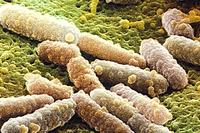-
Research into bird flu raises bioterrorism fears
In order to stay ahead of H5N1, scientists have been tweaking the virus’s genes in the lab to learn more about how this virus works and what it is capable of; in the process, these scientists made the virus more virulent and more contagious; now, security experts and scientists debate whether or not to make the results of these recent experiments public; security experts say doing so could potentially reveal how to make powerful new bioweapons.
-
-
Schools help spot disease outbreaks early
Local public health authorities in Canada are teaming up with schools to develop an early warning disease tracking system; in an effort to spot potential disease outbreaks before they occur, health officials in Peel, Canada are monitoring school absenteeism and emergency department visits
-
-
Ionized plasmas as cheap sterilizer in tough places

Scientists show that ionized plasmas like those in neon lights and plasma TVs not only can sterilize water, but make it antimicrobial; these plasma devices could be life-savers in developing countries, disaster areas, or on the battlefield where sterile water for medical use is in short supply and expensive to produce
-
-
New plan to fight cholera in Haiti meets resistance
Haiti’s latest attempt to stamp out the cholera epidemic that has ravaged its population is meeting sharp criticism from public health authorities; Haiti’s two most prominent health care organizations plan to deploy hundreds of workers to the country’s remote villages and the impoverished alleys of the capital to administer vaccines
-
-
Jefferson County tests flu pandemic vaccination capabilities
Local public health authorities in Jefferson County, New York are currently testing their ability to administer large quantities of flu vaccines in the event of a pandemic by offering to inoculate its residents for free
-
-
Flu shots not effective enough in global outbreak, report finds
A new study reveals that seasonal flu shots are not effective enough to protect people in the event of a pandemic; “Today’s flu shot is like an iPhone 1.0,” said the study’s author, Dr. Michael Osterholm, the director of the Center of Excellence for Influenza Research and Surveillance at the University of Minnesota; “What we need is an iPhone 10.0”
-
-
Mysterious incident leaves more than 20 high-schoolers sick
Public health authorities in Texas are investigating a mysterious incident that left more than twenty people sick during a high school football game in Houston last Friday; the stadium was immediately evacuated and a Hazmat team dispatched, while a total of twenty-two students were taken to several local hospitals for treatment
-
-
Quickly and accurately tracing food-borne outbreaks
Researchers have developed a new technique that could pinpoint the exact nature and origin of food-borne bacteria with unprecedented accuracy
-
-
"Printing" food with plant DNA to prevent counterfeiting
Branded foods from the waters off Japan are becoming popular in Asia; the growing popularity has lured counterfeiters into the market, where they sell common foods as the high-value brand, in the process destroying markets and reputation of the real item
-
-
"Vampire" bacteria may serve as living antibiotic
A vampire-like bacteria that leeches onto specific other bacteria — including certain human pathogens — has the potential to serve as a living antibiotic for a range of infectious diseases, a new study indicates
-
-
Source of St. Louis E.coli outbreak still uncertain

Public health officials in Missouri are scrambling to locate the source of an E.coli outbreak that has infected twenty-six people in one week; health authorities believe that Schnucks, a chain of salad bars, may be the culprit, but so far tests for the bacteria have all come back negative
-
-
New testing capabilities for bioterror threats
Research presented at the 13th Medical Biodefense Conference in Munich says that Abbott’s PLEX-ID system provides reliable and rapid results for key microbial biothreat agents and should be considered as a first line analytical tool for biodefense, biosecurity, and microbial forensics programs
-
-
Natural killer cells may be the best defense against anthrax
One of the things that makes inhalational anthrax so difficult for biodefense experts to deal with is the speed with which a relatively small number of inhaled anthrax spores can turn into a lethal infection; by the time an anthrax victim realizes he or she has something worse than the flu, it is often too late
-
-
U.S. is not ready for bioterror attacks
Since 9/11, the U.S. government has spent more than $60 billion of bolstering U.S. defenses against a terrorist attack using biological agents. The money paid for air sensors in major cities, intensified efforts to develop vaccines and treatments for anthrax and other potential biotrerror weapons, educating doctors about bioterror attack symptoms, distributing equipment to hospitals around the country, and more. Still, even within the biodefense community, there is a wide-spread belief that these measures have not made the United States meaningfully less vulnerable to a bioterror attack.
-
-
Government considers testing anthrax vaccine on children

The U.S. government is considering testing its anthrax vaccine on children to determine if it has any potential side effects; so far the government’s anthrax vaccine has only been tested on adults and members of the National Biodefense Science Board argued that there had been no tests to determine the effectiveness of the vaccine on children; opponents of the suggestion have sharply criticized it on the grounds that it is unethical to test a vaccine on children especially if there is no immediate threat; proponents of testing the vaccine acknowledged the criticism, but maintained that it was critical to ensure the safety of the vaccine on children in the event that it had to be administered; the board is set to meet again on Friday to vote on its controversial recommendation
-
More headlines
The long view
We Ran the C.D.C.: Kennedy Is Endangering Every American’s Health
Nine former leaders of the Centers for Disease Control and Prevention (CDC), who served as directors or acting directors under Republican and Democratic administrations, serving under presidents from Jimmy Carter to Donald Trrump, argue that HHS Secretary Roert F. Kennedy Jr. poses a clear and present danger to the health of Americans. He has placed anti-vaxxers and conspiracy theorists at top HHS positions, and he appears to be guided by a hostility to science and a belief in bizarre, unscientific approaches to public health.
